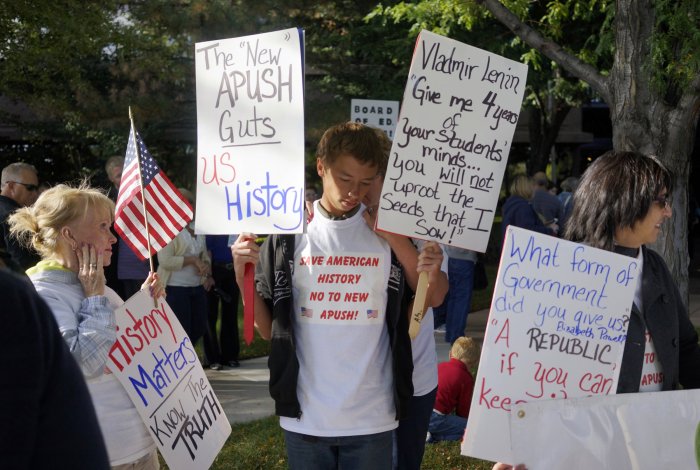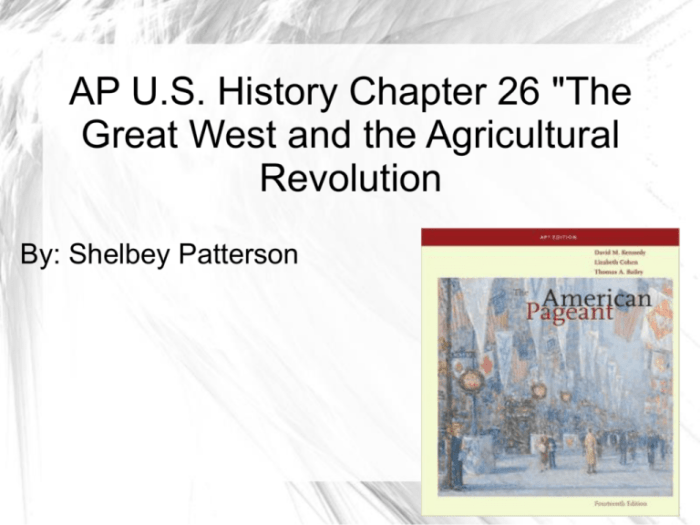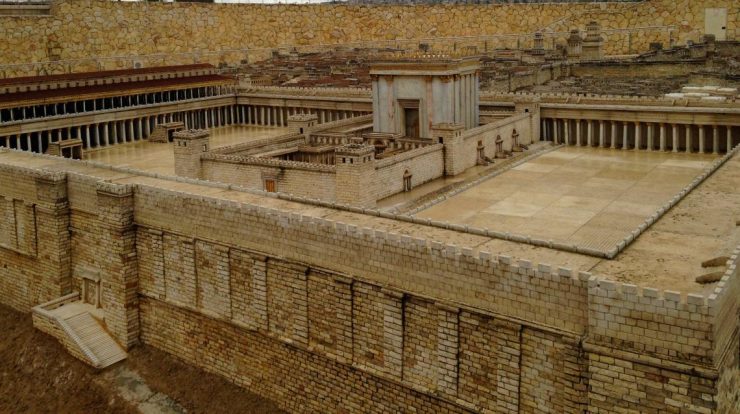Ap us history american pageant notes – Embark on a journey through American history with AP US History: American Pageant Notes. This comprehensive guide delves into the key themes, events, individuals, and developments that have shaped the United States. Prepare to engage with an authoritative and captivating narrative that will illuminate the complexities of America’s past and present.
Our exploration begins with an overview of the central themes and concepts that provide the framework for understanding American history. We will examine the historical context and significance of these ideas, tracing their impact on the nation’s development.
Key Themes and Concepts in American Pageant

American Pageant, a widely acclaimed textbook on United States history, presents a comprehensive exploration of the nation’s past, emphasizing pivotal themes and concepts that have shaped its trajectory. These include:
- Democracy and Freedom:The enduring struggle for individual rights, representative government, and the pursuit of liberty.
- Equality and Opportunity:The ongoing pursuit of social and economic equality, challenging persistent disparities and striving for a more just society.
- Individualism and Community:The tension between self-reliance and the importance of collective action, fostering both personal autonomy and societal cohesion.
- Diversity and Immigration:The transformative impact of immigration on American society, shaping its cultural landscape and driving economic growth.
- Expansion and Conflict:The westward expansion of the United States and the resulting conflicts with Native American tribes, shaping the nation’s territorial boundaries and identity.
- Technology and Innovation:The profound influence of technological advancements on American society, driving economic growth, social change, and global leadership.
- War and Diplomacy:The role of military conflicts and diplomatic efforts in shaping American foreign policy and its standing in the international arena.
Major Events and Eras in American History

American history is a rich tapestry of events and eras, each shaping the nation’s identity and trajectory. From the colonial era to the present day, key moments have left an enduring mark on American society, forging its values, institutions, and culture.
This timeline explores some of the most significant events and eras in American history, examining their causes, consequences, and impact on the nation.
Colonial Era (1607-1763)
The colonial era marked the establishment of European settlements in North America. Driven by economic opportunities and religious freedom, English, French, and Dutch colonists arrived in the New World, bringing with them their own cultures, traditions, and ambitions. This era saw the founding of major cities, the development of colonial economies, and the emergence of tensions between the colonists and the indigenous populations.
American Revolution (1765-1783)
The American Revolution was a pivotal conflict that led to the separation of the American colonies from British rule. Sparked by grievances over taxation and political representation, the revolution witnessed the rise of prominent figures such as George Washington, Thomas Jefferson, and Benjamin Franklin.
The Declaration of Independence in 1776 marked a decisive moment, asserting the colonies’ desire for independence. The war ended in 1783 with the Treaty of Paris, establishing the United States of America as a sovereign nation.
Influential Individuals in American History
Influential individuals have played pivotal roles in shaping the course of American history. Their contributions, motivations, and impact have left an enduring legacy on American society.
Founding Fathers
The Founding Fathers were a group of statesmen who played a central role in the American Revolution and the establishment of the United States. Their ideas and principles, enshrined in the Declaration of Independence and the Constitution, have profoundly influenced American political thought and governance.
Presidents
American presidents have held the highest office in the land and have wielded immense power in shaping domestic and foreign policy. Some of the most influential presidents include:
George Washington
Led the Continental Army to victory in the Revolutionary War and became the first president of the United States.
Abraham Lincoln
Presided over the Civil War and issued the Emancipation Proclamation, which abolished slavery in the United States.
Franklin D. Roosevelt
Led the United States through the Great Depression and World War II and implemented the New Deal, a series of economic and social reforms.
Reformers
Reformers have fought for social justice, equality, and the expansion of democracy. Notable reformers include:
Frederick Douglass
Escaped slavery and became a leading abolitionist, advocating for the end of slavery and equal rights for African Americans.
Susan B. Anthony
Co-founded the National Woman Suffrage Association and fought for women’s suffrage.
Martin Luther King Jr.
Led the civil rights movement and advocated for nonviolent resistance to racial discrimination.
Inventors
Inventors have revolutionized American society through their technological innovations. Some of the most influential inventors include:
Thomas Edison
Invented the light bulb, phonograph, and motion picture camera.
Alexander Graham Bell
Invented the telephone.
Henry Ford
Revolutionized manufacturing with the assembly line and made automobiles affordable for the average American.
Entrepreneurs
Entrepreneurs have played a crucial role in the American economy and have created jobs and wealth. Notable entrepreneurs include:
Andrew Carnegie
Founded the Carnegie Steel Company and became one of the richest men in the world.
John D. Rockefeller
Founded the Standard Oil Company and became the world’s first billionaire.
Bill Gates
Co-founded Microsoft and became one of the richest people in the world.These influential individuals have left an indelible mark on American history. Their contributions, motivations, and impact have shaped the nation’s political, social, economic, and technological landscape.
Social and Cultural Developments in American History
The United States has undergone significant social and cultural transformations throughout its history. These developments, including immigration, urbanization, industrialization, and the evolving roles of women and minorities, have profoundly shaped American society and culture.
The arrival of immigrants from diverse backgrounds has enriched American culture with new languages, customs, and traditions. Urbanization led to the growth of cities, transforming the way Americans lived and worked. Industrialization brought technological advancements and economic growth, but also social challenges such as labor exploitation and inequality.
Immigration
- Waves of immigration from Europe, Asia, and Latin America have contributed to the ethnic and cultural diversity of the United States.
- Immigrants have brought their languages, religions, and traditions, enriching American culture and shaping its identity.
- Immigration has also led to debates about national identity, assimilation, and the role of immigrants in American society.
Urbanization, Ap us history american pageant notes
- The growth of cities in the late 19th and early 20th centuries transformed American life.
- Urbanization brought new opportunities for employment, education, and entertainment, but also challenges such as overcrowding, pollution, and crime.
- Cities became centers of cultural innovation and social change, fostering the development of new art forms, ideas, and movements.
Industrialization
- The Industrial Revolution brought about technological advancements and economic growth, but also social problems.
- Industrialization led to the rise of factories and mass production, creating new jobs but also exploiting workers and leading to labor unrest.
- The concentration of wealth in the hands of industrialists created social and economic inequalities, contributing to social tensions and the rise of labor unions.
Changing Roles of Women and Minorities
- Throughout American history, women and minorities have faced discrimination and limited opportunities.
- The women’s suffrage movement fought for the right of women to vote, and the civil rights movement challenged racial segregation and discrimination.
- These movements have led to significant changes in the roles and status of women and minorities in American society, although challenges and inequalities persist.
Political and Economic Developments in American History

The political and economic developments in American history have significantly shaped the nation’s trajectory. The evolution of American government, the development of political parties, and the growth of the American economy have profoundly impacted American society and the world.
Evolution of American Government
The American government has undergone a series of transformations since its inception. The Articles of Confederation, adopted in 1781, established a loose confederation of states with a weak central government. The Constitution, ratified in 1789, created a stronger federal government with three branches: legislative, executive, and judicial.
The Constitution has been amended 27 times, reflecting the changing needs and values of the American people.
Development of Political Parties
Political parties emerged in the United States during the 1790s, with the Federalist Party and the Democratic-Republican Party representing different ideological perspectives. The two-party system has dominated American politics since the 1820s, although third parties have occasionally played significant roles.
Growth of the American Economy
The American economy has experienced remarkable growth since the nation’s founding. The Industrial Revolution, which began in the late 18th century, transformed the United States into a leading industrial power. The expansion of the railroads, the rise of big business, and the development of new technologies have all contributed to the nation’s economic prosperity.
Foreign Policy and International Relations
Throughout its history, the United States has played a significant role in global affairs. Its foreign policy and international relations have been shaped by a complex interplay of domestic politics, economic interests, and ideological beliefs. This engagement has involved participation in wars and conflicts, as well as the development of alliances and partnerships with other nations.
America’s involvement in international affairs has had a profound impact on both American society and the world. It has influenced the nation’s economic development, shaped its political landscape, and contributed to the spread of American values and ideas.
America’s Role in Global Affairs
The United States has been a major player in global affairs since its founding. Its role has evolved over time, from a relatively isolated nation to a global superpower.
- In the 19th century, the United States pursued a policy of isolationism, avoiding entanglements in European affairs.
- In the early 20th century, the United States became more involved in international affairs, particularly in the Western Hemisphere.
- After World War II, the United States emerged as a global superpower, with a leading role in the Cold War and other international conflicts.
Today, the United States remains a major player in global affairs, with a wide range of interests and commitments around the world.
America’s Involvement in Wars and Conflicts
The United States has been involved in numerous wars and conflicts throughout its history.
- The American Revolutionary War (1775-1783) was a war of independence against British rule.
- The War of 1812 (1812-1815) was a war against Great Britain over issues of trade and territorial expansion.
- The Mexican-American War (1846-1848) was a war against Mexico over the annexation of Texas.
- The Civil War (1861-1865) was a war between the Northern and Southern states over the issue of slavery.
- The Spanish-American War (1898) was a war against Spain over the issue of Cuban independence.
- World War I (1914-1918) was a global war in which the United States fought against Germany and its allies.
- World War II (1939-1945) was a global war in which the United States fought against the Axis powers, including Germany, Japan, and Italy.
- The Korean War (1950-1953) was a war between North Korea and South Korea, in which the United States fought on the side of South Korea.
- The Vietnam War (1954-1975) was a war between North Vietnam and South Vietnam, in which the United States fought on the side of South Vietnam.
- The Gulf War (1990-1991) was a war against Iraq over the invasion of Kuwait.
- The War on Terror (2001-present) is a global war against terrorism, in which the United States has been involved in Afghanistan, Iraq, and other countries.
These are just a few of the many wars and conflicts in which the United States has been involved.
America’s Relationships with Other Nations
The United States has a wide range of relationships with other nations, from close alliances to hostile rivalries.
- The United States has close relationships with many of its Western allies, including Canada, the United Kingdom, and France.
- The United States has a complex relationship with China, which is both a major economic partner and a strategic rival.
- The United States has a hostile relationship with North Korea, which is a nuclear-armed state.
- The United States has a long history of involvement in Latin America, and has often intervened in the affairs of other countries in the region.
- The United States has a complex relationship with the Middle East, and has been involved in several wars and conflicts in the region.
These are just a few examples of the many relationships that the United States has with other nations.
The Impact of Foreign Policy on American Society
America’s foreign policy has had a profound impact on American society.
- Wars and conflicts have shaped the nation’s political landscape and its economic development.
- Foreign policy has also influenced the nation’s cultural identity and its values.
- The United States’ role in global affairs has also had a significant impact on the world.
The United States has been a major force for peace and stability in the world, and has also been a major promoter of democracy and human rights.
Commonly Asked Questions: Ap Us History American Pageant Notes
What is the scope of AP US History: American Pageant Notes?
These notes cover the entirety of American history, from the colonial era to the present day.
How are the notes organized?
The notes are organized chronologically, with each chapter covering a specific period or theme in American history.
What is the level of detail in the notes?
The notes provide a comprehensive overview of American history, with a focus on key events, individuals, and concepts.


